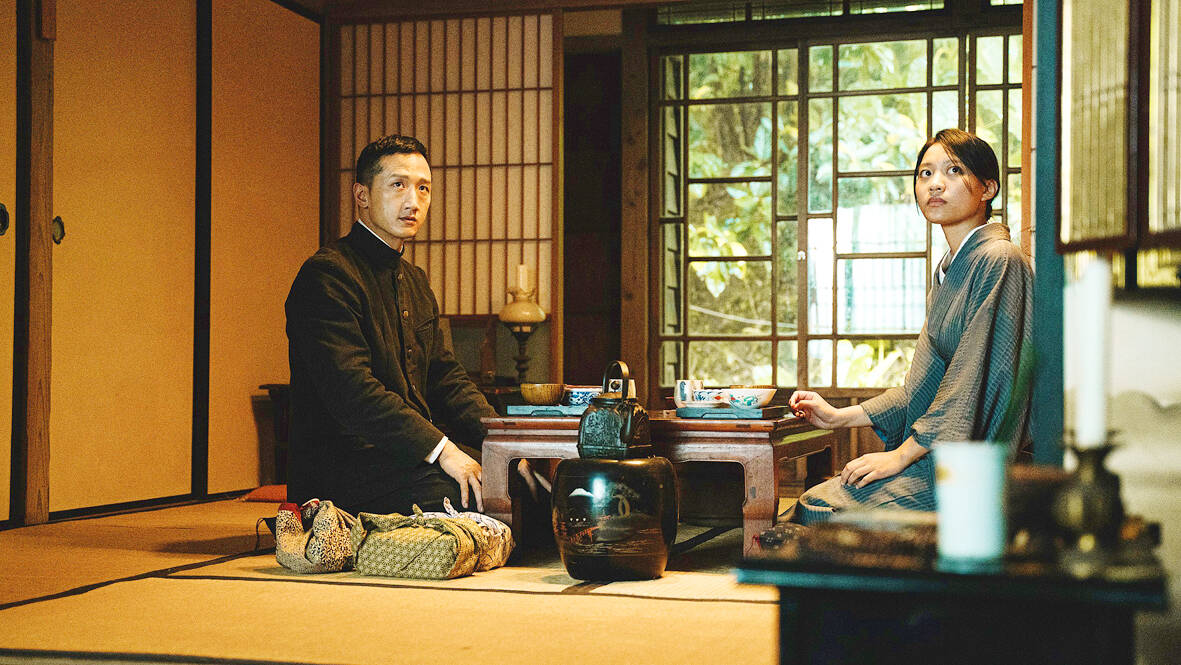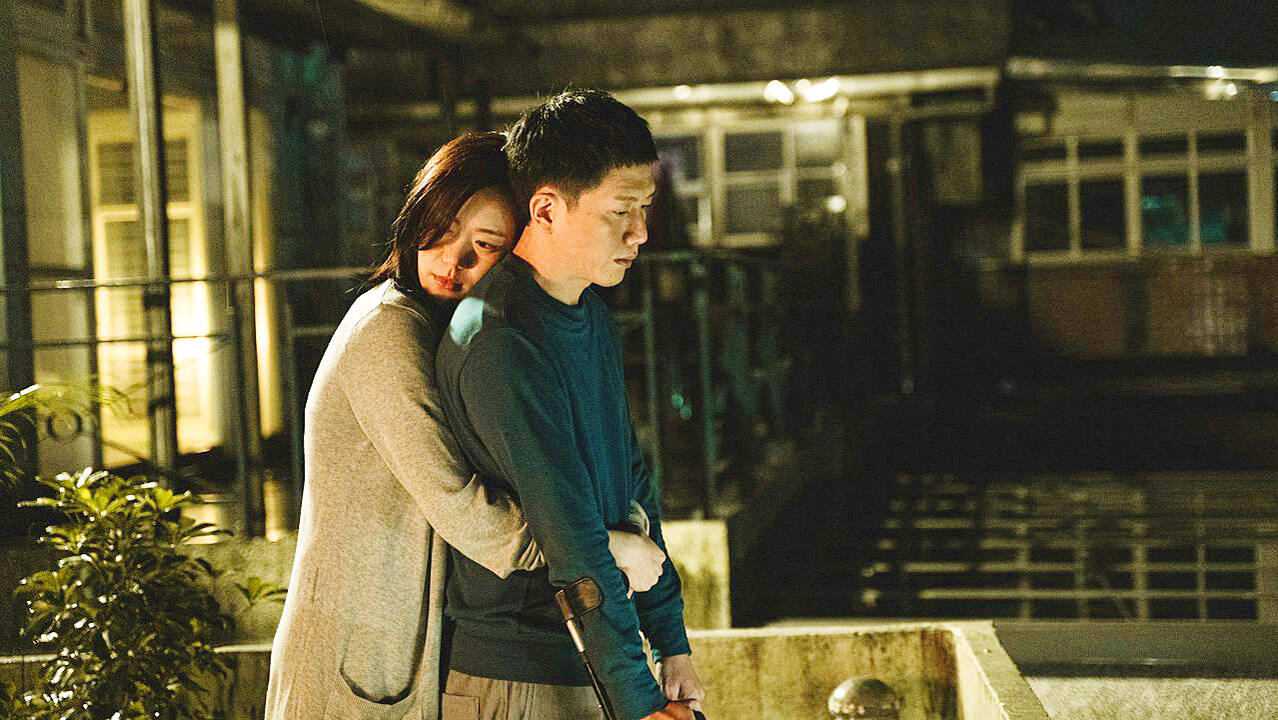Struggling with his once-promising career, dispirited astronomer Cheng-hsiu (Mo Tzu-yi, 莫子儀) has pushed his wife and child away from him, moving lifelessly through his days, and haunted by his dreams and personal demons. The slowness is also literal, as Cheng-hsiu walks with a cane due to a congenital leg condition.
Murmurs of Memories is an oblique and rather confusing story that shifts between the present, Cheng-hsiu’s childhood and a seemingly unrelated tale of a Paiwan princess (Chien Hsiao-yi, 簡孝儀) who is forced away from her idyllic life to become the wife of a Japanese commander during the Japanese colonial era. The only part that initially connects the two eras at first are the colliding binary stars whose brightness can be seen during the day, a topic that Cheng-hsiu has repeatedly failed in obtaining funding to study despite his early success in the area.
The three parts are further separated by language, Mandarin in the present, Hoklo (also known as Taiwanese) during the flashbacks and Paiwan/Japanese in the historic tale, showing the cultural shifts in Taiwan over a century.

Photo courtesy of CPT Entertainment
Most of the film relies on such implicit connections that the audience may or may not make. Some are slightly more obvious, but very little is said directly. For those who aren’t adept at detecting such subtleties, Murmurs of Memories still makes for a moody, artsy piece about modern, middle-aged loneliness, but there’s apparently much more below the surface. Even the presenter at the beginning of the premiere screening said that it’s a film that might need to be watched a few times.
There are little hints throughout the film that suggest that the Paiwan princess may be Cheng-hsiu in his past life, especially as the concept of reincarnation is repeatedly brought up. In fact, according to the movie synopsis (which this reviewer usually doesn’t read before going in), it’s a tale about someone who is tortured because they forgot to drink the “mengpo tea” (孟婆湯), which, according to traditional beliefs, erases the memories a previous life before reincarnation.
There’s also some curious parallels, such as Cheng-hsiu being overshadowed at work by a Japanese colleague who turns out to be quite a slimy character, and his brief encounter with female student (it isn’t pictured how far it goes) Pluto (Yeh Ying, 葉穎), who likes to talk about stars and past lives. The synopsis says that she may be Cheng-hsiu’s lover from his past life, but that is in no way apparent from just watching the film.

Photo courtesy of CPT Entertainment
Cheng Hsiu’s wife (Joanne Deng, 鄧九雲), who gave up a piano career to become a housewife, and their young child visibly suffer from his absences and indifferent attitude, but it’s unclear if they refer to anything in the past life, or are they just victims of Cheng Hsiu’s inability to let go of his past. There’s a lot more left unexplained — especially the lack of a backstory in the Japanese era scenes.
Now thinking back, it seems that many scenes that felt out of place while viewing, such as a fight Cheng-hsiu’s daughter got into at school, or him visiting his dying father with his estranged brother, were also placed in there to help Cheng Hsiu slowly snap back to reality.
It’s just hard to analyze all of this while the movie goes on. The gist of the film is apparent, but like most people’s memories, it is disjointed and doesn’t always make immediate sense. Perhaps one will discover new things on a second viewing, but it’s not riveting enough to warrant that.

Eric Finkelstein is a world record junkie. The American’s Guinness World Records include the largest flag mosaic made from table tennis balls, the longest table tennis serve and eating at the most Michelin-starred restaurants in 24 hours in New York. Many would probably share the opinion of Finkelstein’s sister when talking about his records: “You’re a lunatic.” But that’s not stopping him from his next big feat, and this time he is teaming up with his wife, Taiwanese native Jackie Cheng (鄭佳祺): visit and purchase a

April 7 to April 13 After spending over two years with the Republic of China (ROC) Army, A-Mei (阿美) boarded a ship in April 1947 bound for Taiwan. But instead of walking on board with his comrades, his roughly 5-tonne body was lifted using a cargo net. He wasn’t the only elephant; A-Lan (阿蘭) and A-Pei (阿沛) were also on board. The trio had been through hell since they’d been captured by the Japanese Army in Myanmar to transport supplies during World War II. The pachyderms were seized by the ROC New 1st Army’s 30th Division in January 1945, serving

The People’s Republic of China (PRC) last week offered us a glimpse of the violence it plans against Taiwan, with two days of blockade drills conducted around the nation and live-fire exercises not far away in the East China Sea. The PRC said it had practiced hitting “simulated targets of key ports and energy facilities.” Taiwan confirmed on Thursday that PRC Coast Guard ships were directed by the its Eastern Theater Command, meaning that they are assumed to be military assets in a confrontation. Because of this, the number of assets available to the PRC navy is far, far bigger

The 1990s were a turbulent time for the Chinese Nationalist Party’s (KMT) patronage factions. For a look at how they formed, check out the March 2 “Deep Dives.” In the boom years of the 1980s and 1990s the factions amassed fortunes from corruption, access to the levers of local government and prime access to property. They also moved into industries like construction and the gravel business, devastating river ecosystems while the governments they controlled looked the other way. By this period, the factions had largely carved out geographical feifdoms in the local jurisdictions the national KMT restrained them to. For example,